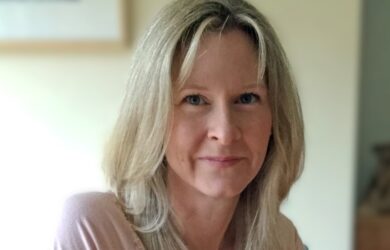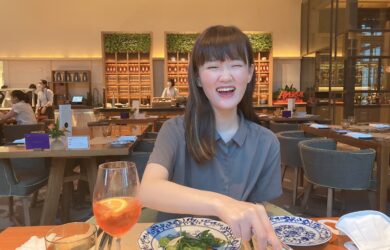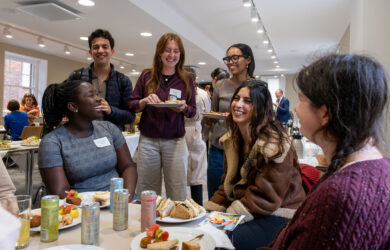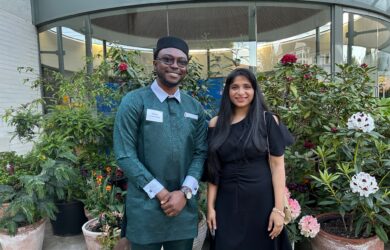
Gates Cambridge Scholar Elect Lizzie Presser talks about how she set up a news website in north-east Thailand and her current work with Pulitzer Prize-winning journalists.
Lizzie Presser studied the ancient world at university. It’s perhaps an unusual background for someone setting up an influential online news service on the present-day problems in north-east Thailand. But just days after graduating in classics from Princeton, Lizzie headed to Thailand and within months had started filing reports on growing and under-reported protests in the northeast for a free and fair election and a transparent judicial system.
While still on the organisation’s editorial board, she has now branched out into solutions-based journalism in the US and is finishing working on a book on anti-poverty programmes with two Pulitzer prize-winning US journalists. She believes this could be an important direction for future journalism and her MPhil in Public Policy, which she begins at the University of Cambridge in October, will broaden her interests in social policy further.
Lizzie was born in New York to highly political parents. Her mother is a healthcare advocate and her father runs a private equity firm. In part she rebelled against politics in her teen years, opting to study classics at Princeton due to an early interest in the Greek Classics. However, after four years at Princeton learning about the roots of western cultural history and story-telling she felt the need to learn about the eastern hemisphere and do something completely different, so four days after graduating she headed for north-east Thailand, courtesy of a nine-month fellowship from the Princeton in Asia programme which sends college graduates from across the US to work in Asia. When she arrived, Lizzie was teaching English to university students. It was a tense time with protests against the government taking place around the country. The north-east is the hotbed of the self-proclaimed pro-democracy group called the Red Shirts.
News website
Lizzie had read about the political situation before she arrived, but she wanted to find out the deeper context in which the protests were taking place. She started learning Thai, and read up on the history. She arrived in June 2010 and by December she had a good grasp of the basic language. By the following February she was writing news articles and by June she and her co-worker, a Princeton graduate in art history, had secured funding from the Carrie Gordon Tribute Fellowship to hire staff and create a website.
Elizabeth says: “There was an urgency to get more news out of north-east Thailand and to tell the story from the point of views of northeasterners.” She says it was hard to come by neutral reporting on the north east in the Thai press, but she and her co-worker concentrated on reporting the facts. “Almost all of the English-language news was very Bangkok-centric and was telling a very different story from what was going on in the north east. The Bangkok media tended to depict the people of the north east as less educated and less worthy, as violent and irrational. They are ethnically Lao and are often dismissed as inferior based on the colour of their skin,” she states.
Her first articles were written on the New Mandala blogspot which is run by Australian academics. Almost immediately they got good feedback. “We thought we would be writing for the people of the north east to spread information on what was going on, but it started being read by people with a deep interest in Thai events, including academics, journalists and diplomats. People wanted to find out what was going on and to understand it better,” said Lizzie.
The Carrie Gordon Fellowship gave the two graduates $10K which they used to build a website which was in English and Thai and hire staff. The latter was harder than they thought. They had planned to hire journalism students, but many were apolitical. Translators were also reluctant to get involved in politics. “It’s a very non-confrontational culture. People didn’t want to ask provocative questions, especially of their elders. Maybe we were too confrontational and the translators helped to teach us how to work and phrase the more political questions,” she says.
Solutions-based journalism
After two years Lizzie returned home in May 2012, but is still editing stories and is on the editorial board of the news organisation, which is transitioning to a more Thai leadership and attempting to build partnerships with other news organisations. She had done some writing of short news videos for the website in Thailand which her co-founder shot and edited and was interested in exploring that more and doing more advocacy work.
She applied for a job at Show of Force, the production company of the Half the Sky Movement which campaigns for women’s rights. She got a job launching and leading a student campaign around the Half the Sky Movement book and documentary. She linked up with existing organisations which work on campuses and with students who expressed an interest in getting involved via the website. She also set up incentives for students recruiting other students and reached out to others on social media, such as through google hangouts, as well as developing a one-year framework to guide students through an extracurricular programme on women’s rights.
In December 2012 she started working as a research assistant for Pulitzer Prize-winning journalists Nicholas Kristof and Sheryl WuDunn on their forthcoming book that examines the neuroscience of altruism and the effectiveness of anti-poverty programmes and how the best programmes can get taken up by policymakers. “It’s about how we know what programmes should be scaled up,” says Lizzie.
She believes solutions-based journalism is something that delivers news which people will want in an era of dwindling circulation. “There’s still a huge thirst for news. It’s how you monetise it,” she says. “Solutions-based journalism plays to the market. It’s focused on more positive news and on what works in the social sector. It’s not feel good news, though. It’s evidence-based and analytical and reaches a wide array of people.”












